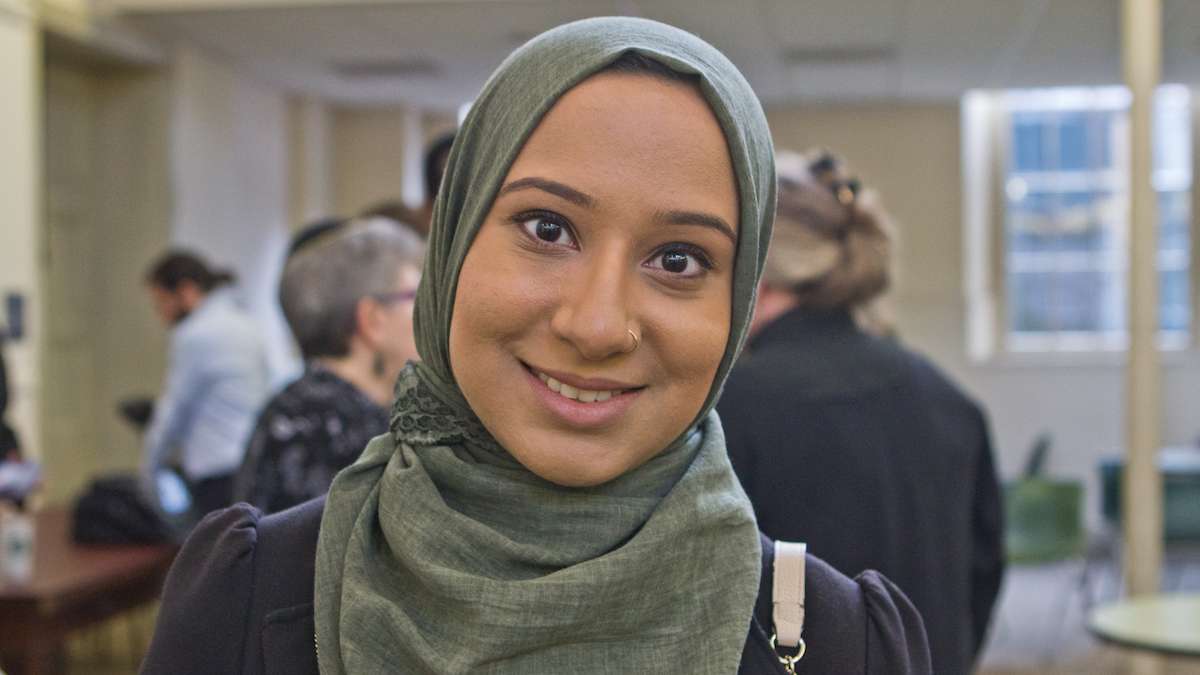As anti-Muslim attacks skyrocket, interfaith leaders demand denunciation from Trump
In the six days since Donald Trump claimed a narrow victory against Hillary Clinton in their brutal battle for the White House, local interfaith leaders say Muslim-bashing has exploded nationally and locally, prompting them to call on the president-elect Monday to denounce hate attacks on Muslims and other minorities.
In Trenton, a passer-by threw hot coffee on a female college student wearing a hijab. At a Philadelphia hospital, a patient refused to be treated by a Muslim doctor. On one West Philadelphia block, someone threw a rock through a Muslim family’s window, and on another, four men shouted out their car windows at a Muslim woman to remove her head scarf or leave the country.
In the six days since Donald Trump claimed a victory against Hillary Clinton in their brutal battle for the White House, local interfaith leaders say Muslim-bashing has exploded nationally and locally, prompting them to call on the president-elect Monday to denounce hate attacks on Muslims and other minorities.
“We’re here to affirm … that we accept the peaceful transfer of power as the result of the election,” said Jacob Bender, executive director of Philadelphia’s chapter of the Council on American-Islamic Relations (CAIR). “However we insist that the Trump administration respect the civil rights of all the residents of our country, notwithstanding the incendiary and bigoted statements against Muslims, Mexicans, and women made during the campaign by candidate Trump.”
Leaders from the Muslim, Jewish, and Christian faiths joined Bender in his call, urging followers to report anti-Muslim acts to police and to counter hate by various means. Rabbi Linda Holtzman of the Reconstructionist Rabbinical College and Tikkun Olam Chavurah, for example, said she and others spent last weekend going door to door in West Philadelphia and other city neighborhoods to ask merchants to post fliers reading “Stop profiling Muslims” and “Standing with Muslims Against Islamophobia and Racism.”
“As a Jew, I know what fear can do to a people. I know that living in terror is no way to live,” Holtzman said.
The Rev. Linda Noonan, senior pastor at the Chestnut Hill United Church, agreed: “We all knew these hatreds lie disguised only by the thinnest veil of civility. That veil has been lifted … [Now] it’s not enough to say we don’t stand with him. We need to say we stand with [persecuted minorities], and with each other.”
Their united front came just a day after Trump tapped Stephen K. Bannon to be his chief strategist, a staffing decision that infuriated critics who predicted it would empower white nationalists. Bannon, executive director of the conservative Breitbart News regarded by critics as a race-baiter with inflammatory, fringe views on virtually all minority groups, frequently hosted anti-Muslim extremists on his daily radio show.
“We urge President-elect Trump to reconsider the ill-advised appointment of white nationalist Stephen Bannon if he seeks to unite Americans,” CAIR’s national director Nihad Awad said.
Jonathan Greenblatt, CEO of the Anti-Defamation League, agreed: “It is a sad day when a man who presided over the premiere website of the ‘alt right’ — a loose-knit group of white nationalists and unabashed anti-Semites and racists — is slated to be a senior staff member in the ‘people’s house.'”
Trump has been blunt in his feelings toward Muslims.
He has called for the creation of a database of American Muslims, a ban on Muslim immigrants, and increased surveillance and identification cards for Muslims.
Human-rights advocates say such rhetoric has helped fuel a spike in anti-Muslim hate crimes, which already were rising. Hate crimes against Muslims surged 67 percent last year over the previous year, with 257 incidents reported in 2015, compared to 154 the year before, according to the FBI. That’s the most Islamophobic incidents since the 9/11 attacks in 2001. Experts attributed last year’s spike to anti-Muslim backlash from the terror attacks in Paris and San Bernardino, California.
This year is on pace to exceed that. During the three days after Election Day alone, for example, minorities reported more than 200 incidents of harassment and intimidation across the country, according to the Southern Poverty Law Center. You don’t have to hunt hard to find examples of anti-Muslim hate crimes that have happened during Trump’s campaign or since his election. Just read here, here, here, here, here, here, here, and here.
Trump, meanwhile, has not commented extensively on such incidents. Asked by the Wall Street Journal if his campaign rhetoric had gone too far, he responded: “No. I won.”
Meanwhile, area Muslims are doing what they can to counter the hate, in even small ways.
Interfaith groups at Drexel University, for example, plan to get together for a potluck dinner on campus this Thursday. Muslim students at the University of the Sciences handed passers-by yellow roses last week in a show of peace. And the Philadelphia Muslim Students Association Council is urging Muslim students to travel in groups, or call campus security for escorts, if they fear harassment or attacks.
Noor Jemy, a recent Drexel graduate who heads that council, said since Election Day she has avoided venturing far from the college campuses where she now advocates for Muslim students, worried she might encounter harassment.
Still, she refuses to remove her hijab, the most visible proof of her faith, as some others have done.
“Regardless of what happens, it is in God’s hands,” said Jemy, 22, of West Philadelphia. “My faith has done nothing wrong. My religion is different from what people say it is, and my religion is not meant to hurt me. If I am hurt, it is because others who are ignorant of my religion are hurting me.”
WHYY is your source for fact-based, in-depth journalism and information. As a nonprofit organization, we rely on financial support from readers like you. Please give today.







